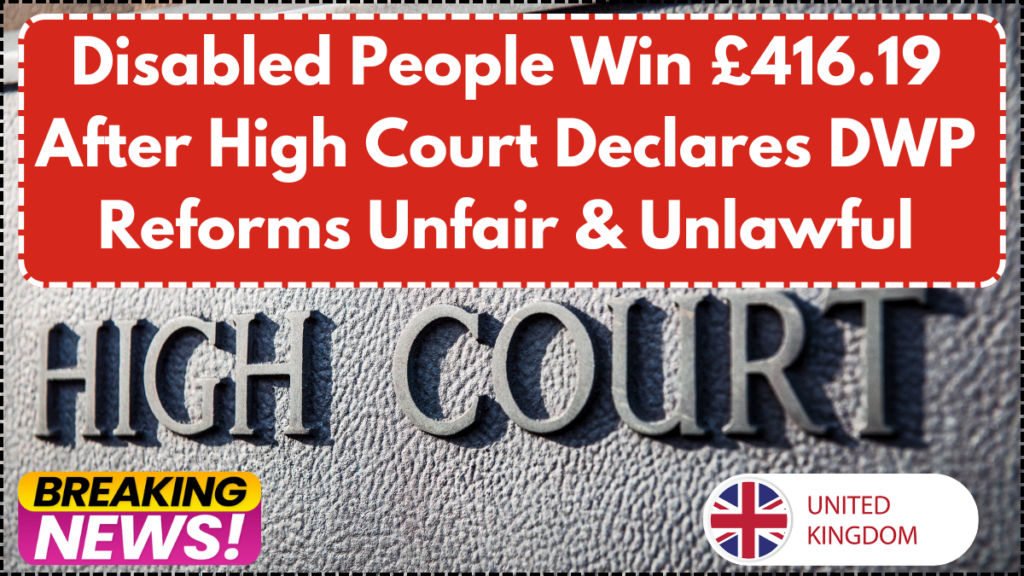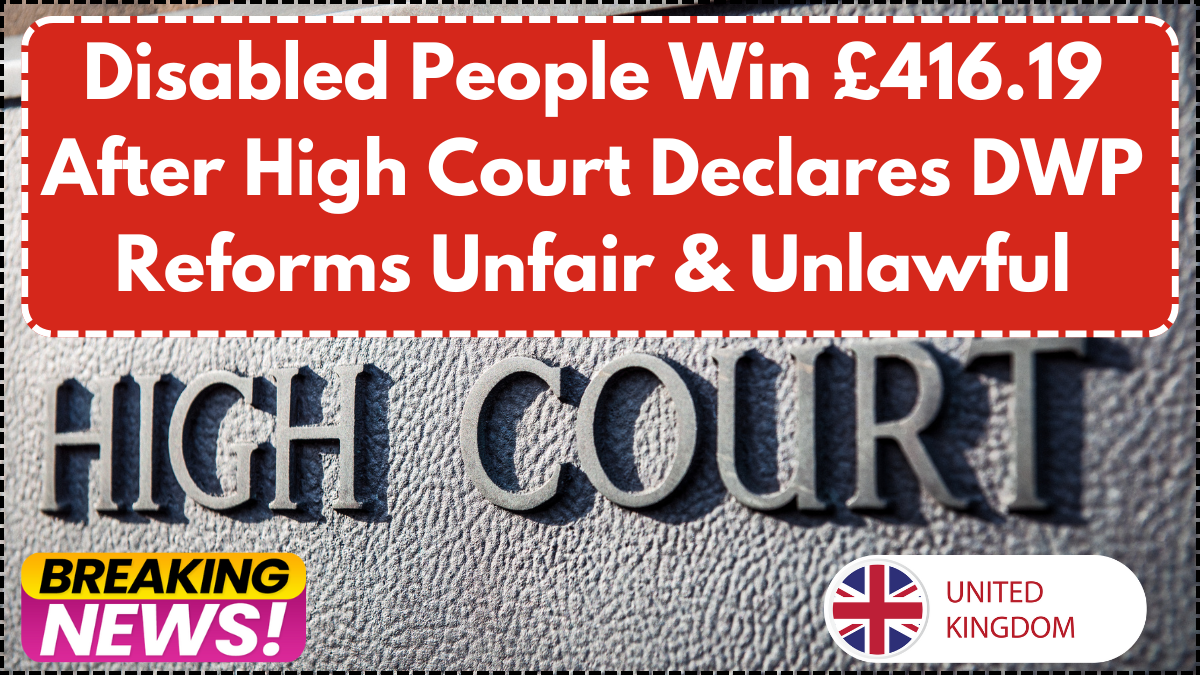In a pivotal legal ruling, the High Court has determined that the Department for Work and Pensions (DWP) acted unlawfully in its recent attempt to reform the Work Capability Assessment (WCA) criteria. These proposed changes, aimed primarily at cutting costs, would have stripped essential benefits—up to £416.19 per month—from nearly 424,000 disabled individuals across the UK. The judgment marks a major win for disability rights and underscores the legal obligation of government departments to conduct fair and transparent consultations.

Summary of the High Court Ruling
| Aspect | Details |
|---|---|
| Policy Targeted | Work Capability Assessment (WCA) Reforms |
| Financial Impact | £416.19 monthly benefit cut for up to 424,000 people |
| Legal Challenge By | Ellen Clifford, with legal support from Public Law Project |
| High Court Conclusion | Consultation was misleading and unlawfully brief |
| Government Reaction | Pledged to re-consult with improved transparency and engagement |
| Advocacy Groups’ Role | Highlighted exclusion and called for co-creation of disability policies |
| Judicial Date | April 2025 update following September 2023 consultation start |
Understanding the Background: What Prompted the Reforms?
In September 2023, the DWP launched an eight-week consultation aimed at reforming the WCA—the system used to determine eligibility for benefits like Employment and Support Allowance (ESA) and the health element of Universal Credit. The department presented the proposal as a move to help disabled individuals re-enter the workforce. However, documents accessed later revealed that the real driver was government cost-saving, not employment outcomes or disability support.
The Specifics of the Proposed Changes
The proposed changes would have significantly tightened eligibility criteria within the WCA. Key descriptors related to mobility, fatigue, mental health, and daily functioning were to be revised or removed entirely, disqualifying thousands who currently rely on support.
According to the Office for Budget Responsibility, the policy would have impacted around 450,000 new applicants, with 97% of them projected to lose over £400 monthly in benefits. Alarmingly, only 15,400 individuals were expected to secure employment as a result of these changes by 2029, demonstrating that the primary outcome would have been financial deprivation, not increased job participation.
Legal Battle: A Win for Disability Rights
The reforms were legally contested by Ellen Clifford, a well-known disability rights activist, with representation from the Public Law Project. The High Court’s decision centered on the lack of transparency in the DWP’s consultation:
-
The consultation misrepresented the true scope and severity of financial losses.
-
It failed to make clear that voluntary support measures would be replaced with mandatory job-seeking activities.
-
The eight-week period was judged to be unlawfully short, especially given the scale and seriousness of the proposed changes.
This ruling highlights that policy consultations must be clear, honest, and inclusive, particularly when vulnerable populations are affected.
What This Means for Disabled People
The High Court’s ruling protected hundreds of thousands from potential financial crisis. Had the reforms been enacted, it’s estimated that over 100,000 disabled individuals could have fallen into poverty. The case has drawn attention to how quickly policy shifts can harm marginalized communities if processes lack proper scrutiny and stakeholder involvement.
Government Response: Promises of Transparency
Following the court decision, Work and Pensions Secretary Liz Kendall committed to relaunching the consultation process. She emphasized that this time it would focus on inclusion, clarity, and active engagement with disabled individuals and advocacy groups. While the government has not ruled out revisiting WCA reforms, it has acknowledged that any future changes must be built collaboratively and fairly.
Advocacy Groups Call for Co-Creation of Policies
Disability advocacy organizations, including Disability Rights UK, have welcomed the ruling as a long-overdue correction. They continue to press for a system in which disabled individuals have direct influence over policies that affect their livelihoods. These groups argue that the voices of disabled citizens are not only crucial but should be central in shaping effective support frameworks.
Conclusion
This ruling isn’t just a legal technicality—it’s a landmark defense of basic rights. As of April 2025, disabled people across the UK have secured a major victory against a government-led attempt to quietly implement benefit cuts under the guise of employment support. The High Court’s intervention reinforces that public consultations must be lawful, clear, and accountable. Moving forward, it’s crucial that any reforms are shaped not just by economic goals, but by justice, inclusion, and lived experience.
Frequently Asked Questions (FAQs)
What was the DWP trying to change in the Work Capability Assessment?
The DWP intended to revise key eligibility criteria, particularly those affecting mental health and mobility. These changes would have made it harder for many to qualify for financial support.
How much money would affected individuals have lost?
Up to £416.19 per month. The government’s own projections showed that nearly 450,000 people could be impacted, most of them without gaining employment in return.
Why did the High Court declare the reforms unlawful?
The court found that the consultation was misleading, especially regarding the financial implications, and too short given the serious consequences. The DWP also failed to properly inform the public about the compulsory changes proposed.
What happens next?
The government has committed to re-consulting on any potential changes, this time with greater transparency and involvement of disabled individuals and advocacy groups.
Who led the legal challenge?
Activist Ellen Clifford, supported by the Public Law Project, spearheaded the legal battle that led to this significant win.
For More Information Click Here
Pari is a passionate writer known for captivating stories that blend imagination and reality. Inspired by travel, history, and everyday moments, Pari crafts narratives that resonate deeply with readers.


